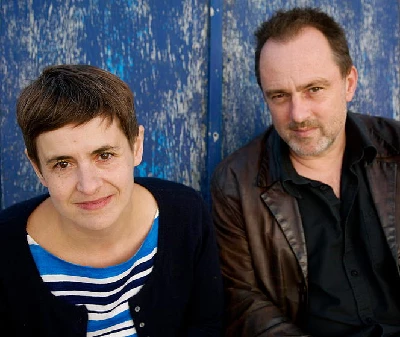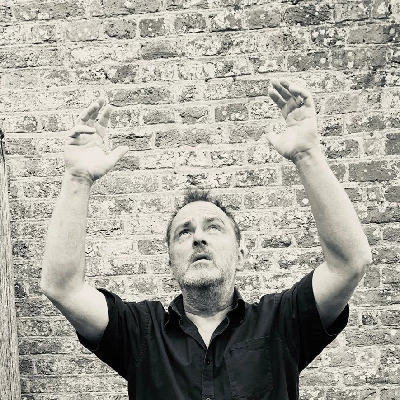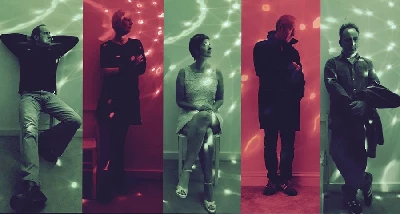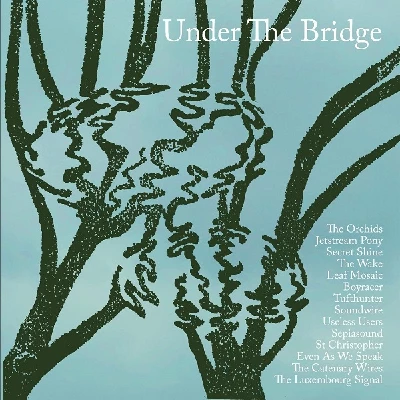published: 21 /
6 /
2022

Rob Pursey from Talulah Gosh, Heavenly, The Catenary Wires and Swansea Sound, talks about his and Amelia Fletcher's new label Skep Wax, and its new compilation 'Under the Bridge' which features acts who were signed to the influential indie label Sarah Records as they are now.
Article
“I used to work on TV,” says Rob Pursey, “and running a label or being in a band is similar to when I worked in TV. When you have a TV programme come out, it is quite exciting, but it is not as exciting as when you have a song played on the radio. The TV programme is scheduled, and you have seen it already about a thousand times and you are already bored with it, and you know that it is going to be on at nine ‘o’ clock on Thursday, whereas songs randomly appear all over the place. You can’t predict when it is going to happen, so when it does it feels slightly more miraculous.”
Rob Pursey has a musical career that extends over thirty-five years, in which he has played with his partner Amelia Fletcher in a variety of indie rock and pop bands including Talulah Gosh, Heavenly, Marine Research, Tender Trap and more recently The Catenary Wires and Swansea Sound.
He is talking on the phone to Pennyblackmusic about Skep Wax, the new label which he and Fletcher have founded. Skep Wax released two albums last year, The Catenary Wires’ third album ‘Birling Gap’ and Swansea Sound’s ‘Live at the Rum Puncheon’. It has now branched out to putting out its first compilation, the fourteen-song, fourteen-band ‘Under the Bridge’, which features current acts whose members, as Pursey and Fletcher were with Heavenly, were signed to the influential Bristol label Sarah Records that existed between 1987 and 1995.
‘Under The Bridge’ features bands from all over the world, and, released on CD with a vinyl edition to follow, its sublime packaging has beautiful photos of bridges near to where each act is based. Some of the groups who appear on ‘Under the Bridge’ – The Orchids, Even As We Speak, St Christopher, Boyracer, The Orchids and The Wake – have carried on running after Sarah folded and until now. Others are new bands. Beth Arzy, who was in Sarah’s late Los Angeles signing Aberdeen, appears twice with both her current acts, The Luxembourg Signal and Jetstream Pony. Peter Momtchiloff, who was in Heavenly with Pursey and Fletcher, is the main force behind behind Tufthunter, Kathryn Smith who was in Secret Shine is the vocalist in debuting French band Useless Users and Josh Meadows from Australian group Leaf Mosaic was in The Sugargliders. ‘Under the Bridge’ features a compelling mix of shoegazing tracks, indie pop anthems, distortion-friendly rock tracks and an instrumental.
Pennyblackmusic spoke to Rob Pursey about Skep Wax and ‘Under the Bridge’.
PB: Heavenly put out three albums and three singles on Sarah Records. How did you get involved with Matt Haynes and Clare Wadd who ran Sarah in the first place?
RP: Funnily enough when Heavenly started Amelia and had talked about starting a label, and we had had conversations with Revolver distribution and they were up for it, but then Matt and Clare came to the second ever Heavenly gig, and we were going to talk to them and get their advice about running a label, and they said, “You can put your records out on our label if you like,” and we agreed and delayed running our label for three decades (Laughs).
PB: All of the acts who were on Sarah talk really well about it. Was it only in hindsight that you realised how remarkable it was or did it seem special at the time?
RP: I certainly appreciate it more in retrospect, particularly now that we are running a label, partly because they were so dedicated to it and partly because they did it really well.
If there was any money to be shared out, they always shared it out pretty much immediately. You never had any questions about the basicsnuts and bolts, which is unusual with record labels. It also felt that at the time that they had created collectively with the bands a kind of scene that became something of a refuge because the culture at the time as far as bands and gigs was getting pretty grim and laddish. The world was limbering up for ‘Loaded’ magazine and Britpop, and it felt that they had defined a space which was somehow immune to all of that. There was also something quietly revolutionary about them in the way they distributed the records, in that that they kept the prices down as far as they could, would only release things that they thought were good, not the things that they thought would sell by the bucketload.
PB: It was also a political label in two ways, firstly in that Matt was left wing when the Tories had been in power for a long time, and secondly in the sense that it was entirely self-sufficient. Was that appealing as well?
RP: Yes, it was. Politically I suppose that I felt in a similar place to the views that Matt expressed. I think that Sarah were ahead of their time as well in that they ignored London and the music press and the big weekly papers which were based there and dominated at the time. They turned their back on all that, and they marketed a space that was as far as possible removed from the corporate side of music. By that time the press had largely abandoned its quite enlightened, critical, ambitious, sometimes even pretentious style, and it felt like that there was one big horrible party going on in London with people that you didn’t want to be with. That was what “the indie industry and press” had become. Sarah, however, carved out and defined a space that has lasted and become a lot more durable than those faux indie labels. It has quite a legacy, I think, and it still inspires people. When I talk to younger people about their point of view, they ask about Sarah, and it has obviously achieved something of a status.
Matt and Clare were running a label like a digital label but in an analogue world. They did it all by the post. They didn’t spend a lot of money on advertising, but they built a community which reminds me a bit of the communities that build up online these days.
PB: How much did you have to do with the rest of the bands on Sarah like The Orchids, The Field Mice, The Wake and Blueboy? Was there a sort of us and them camaradarie?
RP: Heavenly, The Orchids and The Field Mice were all decent-sized bands, and we did play occasional shows together. When we played in London, it felt like the weedy, nerdy kids had come to town, and that felt great because lots of people came to those shows and you were aware that you were collectively bigger than something that was any one band, so there was a sense of something shared.
None of the bands on the label were antagonistic people. None of us were exactly spoiling for a fight. Nobody was very aggressive but having said that the gigs were pretty raucous affairs. There is this conception now that all of the bands were rather gentle and shy and quiet. The gigs were not quiet. All three of those bands could make quite a racket and did, but they did it without putting their feet on the monikers (Laughs).
PB: You said that you were thinking of starting a label in the late 1980s. Why have you finally done so now?
RP: Lockdown partly has to take some of the blame because we had time on our hands. We were always too busy with our day jobs to do it before. Last year we had The Catenary Wires album ready and pretty quickly we had the Swansea Sound album as well, and we thought that it would be a good time to do it because we had two pretty good records and we could test it on our own records, and then if it utterly failed we wouldn’t feel too guilty because it would just be just our bands (Laughs). If you are running a label, it comes with a sense of responsibility because you are putting out other people’s stuff, and you really don’t want to cock it up.
There is a lot of unglamorous work attached to running a label, but between us Amelia and I thought that we could do it. She is much better at some things than I am. I like talking to people. I like writing press releases, that forward-facing thing, but she has been really good at other things. She is very systematic, so she decided that she was going to work out who all the decent indie DJs are and get in touch with them. It took a lot of dedication, but now she has done it she has got this vast database of people who are likely to be into the music. They are all quite supportive. In a way it is reconnecting with people who all have their hearts in the same place. We are doing what I suppose Sarah Records did, which was inhabit a space which was outside the corporate realm.
PB: Why did you decide to put out a compilation as your next step rather than a record by a band?
RP: It was just because the idea for this particular compilation came to me. We are not particularly nostalgic. I don’t listen to a lot of the old Heavenly stuff, but because we had been asked to look out photos for a Heavenly singles compilation I found myself looking back at old gigs posters and paraphernelia from that time. As we had started the label, I was also thinking about Sarah Records at the time, and I was more appreciative of them than I was at the time.
I knew that a lot of the people that had been on Sarah were doing new music. I think we and most of those bands are more excited about what we were doing now than twenty years ago, and I thought it would be interesting to see where they are now. Some of the bands I knew. We have played with Jetstream Pony, and I saw The Orchids play at a festival last year and they had loads of great new songs, but I had never heard them before and I thought at the time, “They’re like us. They’re still in love with it as they ever were.” So, then it was a question of rooting out the others and seeing what was going on.
PB: Some of the acts have, as you say ,remained quite prolific but there are some like Leaf Mosaic and Useless Users who are quite obscure. Did you have problems tracking them down?
RP: No. We knew that Josh Meadows who had been in The Sugargliders was now doing an online radio show in Australia, so he is still active as a DJ. I knew that he had been in The Steinbecks, but I didn’t know that he had been in Leaf Mosaic but one email later and he was like, “Yeah! I will do that.”
Useless Users didn’t exist before lockdown. They were a band that formed during lockdown, but having spoken to Kathryn Smith from Secret Shine she told me about it because she is also involved in that band. and so it was down to her. I think that they are quite pleased to be on it. I was excited because we had a brand new band on the record.
PB: The packaging on ;Under the Bridge’ is fantastic. Where did the concept of the bridges come from?
RP: It was partly a nod to Sarah, who had images of buses and trains on their sleeves from that part of Bristol where they lived. Obviously it is called ‘Under the Bridge’ and, and as the bands are so geographically dispersed in Australia, America, Scotland and England and come from lots of countries, it is quite nice for each one of those bands to be associated with something very local to them, and I just love bridges (Laughs). I think that they are really beautiful. It was indulgent in a way. I thought that they would make a nice collage.
PB: Do you see the main aim of ‘Under the Bridge’ as being to see where artists who have been on Sarah are now?
RP: To a degree. One of the great things about the original Sarah compilations were that people heard new music as a result of them. If you liked The Field Mice or The Orchids, you might hear Heavenly for the first time and go, “Oh, I like that.” Hopefully it is beneficial to all of the bands on it because the people who listen to it or buy it might hear something that they would not have otherwise done.
It is interesting how a group of musicians have remained true to something, which is what we have all done. The attitude and the aesthetic and also the ethos of those bands and the way we all operate remains pure, which I think is quite precious really. You have got fourteen bands on the compilation who all sound very different from each other, but you can sense the common idealism in the way that they do their music.
PB: There are some great surprises on there. Tufthunter, for example. do their number ‘Monsieur Jadis’ in French and Sepiasound do what was effectively a film score with ‘Arcadian’. Did some of the bands’ choices surprise you?
RP: Yeah. I knew Paul Stewart who was in Blueboy and is now in Sepiasound was working more with instrumentals, but I wasn’t sure that was what he would choose to have on the record. I had heard some of the songs that Peter Momtchiloff from Tufthunter had done on their previous LP, but I wasn’t expecting it to come in French.
All the bands chose the tracks that they wanted to use. We didn’t try to give ourselves any choices. One of the nice things about doing it in comparison to your own stuff was opening up the files as they came in from bands and thinking, “What is this one going to be like?” (Laughs). You have no idea, so for a while you are more like a punter and like anyone hearing a LP for the first time. You don’t know quite what is going to come in. Those two are unusual but they are lovely and they fit. It was quite an easy LP to put together because of the diversity in the sounds
PB: The Catenary Wires’ track ‘Wall of Sound’ was written as a reaction to rape culture and violence against women. Was it inspired as its title suggests by Phil Spector in particular?
RP: Yeah. Amelia wrote most of the words on that song, and then we discussed them and changed them. The song was about many men, but it felt too general. We started thinking specifically about women in the studio and music industry environments, who found themselves being on the receiving end of abuse from men We used use some of the sounds and techniques that Phil Spector might have produced. but tried to imagine it in from a perspective of if some of his victims were allowed to talk back.
PB: It was written at the time you were working on ‘Birling Gap’. Why did you decide not to put it on that?
RP: We had too many songs. There is one more that we haven’t put out on the LP as well. All of the songs on ‘Birling Gap’ had a loose thread of continuity as they were about Britain post-Brexit. It is also one of the few songs from those recordings that Amelia just sings on rather than both of us, and it felt lighter and poppier to the other songs on ‘Birling Gap’.
PB: Last question. What is next for Skep Wax?
RP: We have nearly finished the next Swansea Sound LP and there are Catenary Wires songs as well, but they are a bit slower. They take longer to cook, whereas with Swansea Sound we get a pretty good idea and whack it out and it is pretty much done. We are also working on a European Sun LP, which we may also put out. We have also got two LPs by other bands and people who aren’t us coming. So, I suppose we are turning into a proper label (Laughs).
PB: Thank you.
Band Links:-
https://www.skepwax.com/
https://www.facebook.com/skepwax
https://twitter.com/skepwax
http://skepwax.bandcamp.com
Play in YouTube:-
Picture Gallery:-


